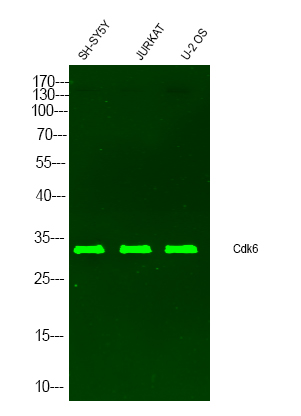Cdk6 Polyclonal Antibody
- Catalog No.:YT5884
- Applications:WB;IHC;IF;ELISA
- Reactivity:Human;Mouse
- Target:
- Cdk6
- Fields:
- >>Cell cycle;>>p53 signaling pathway;>>PI3K-Akt signaling pathway;>>Cellular senescence;>>Cushing syndrome;>>Hepatitis C;>>Measles;>>Human cytomegalovirus infection;>>Influenza A;>>Human papillomavirus infection;>>Kaposi sarcoma-associated herpesvirus infection;>>Epstein-Barr virus infection;>>Pathways in cancer;>>Viral carcinogenesis;>>MicroRNAs in cancer;>>Pancreatic cancer;>>Glioma;>>Melanoma;>>Chronic myeloid leukemia;>>Small cell lung cancer;>>Non-small cell lung cancer;>>Breast cancer;>>Hepatocellular carcinoma
- Gene Name:
- CDK6 CDKN6
- Protein Name:
- Cyclin-dependent kinase 6 (EC 2.7.11.22) (Cell division protein kinase 6) (Serine/threonine-protein kinase PLSTIRE)
- Human Gene Id:
- 1021
- Human Swiss Prot No:
- Q00534
- Mouse Gene Id:
- 12571
- Mouse Swiss Prot No:
- Q64261
- Immunogen:
- Synthetic peptide from human protein at AA range: 280-325
- Specificity:
- The antibody detects endogenous Cdk6
- Formulation:
- Liquid in PBS containing 50% glycerol, 0.5% BSA and 0.02% sodium azide.
- Source:
- Polyclonal, Rabbit,IgG
- Dilution:
- WB 1:500-2000,IHC 1:500-200, ELISA 1:10000-20000. IF 1:50-200
- Purification:
- The antibody was affinity-purified from rabbit antiserum by affinity-chromatography using epitope-specific immunogen.
- Concentration:
- 1 mg/ml
- Storage Stability:
- -15°C to -25°C/1 year(Do not lower than -25°C)
- Other Name:
- Cyclin-dependent kinase 6 (EC 2.7.11.22;Cell division protein kinase 6;Serine/threonine-protein kinase PLSTIRE)
- Observed Band(KD):
- 34kD
- Background:
- cyclin dependent kinase 6(CDK6) Homo sapiens The protein encoded by this gene is a member of the cyclin-dependent protein kinase (CDK) family. CDK family members are highly similar to the gene products of Saccharomyces cerevisiae cdc28, and Schizosaccharomyces pombe cdc2, and are known to be important regulators of cell cycle progression. This kinase is a catalytic subunit of the protein kinase complex that is important for cell cycle G1 phase progression and G1/S transition. The activity of this kinase first appears in mid-G1 phase, which is controlled by the regulatory subunits including D-type cyclins and members of INK4 family of CDK inhibitors. This kinase, as well as CDK4, has been shown to phosphorylate, and thus regulate the activity of, tumor suppressor protein Rb. Expression of this gene is up-regulated in some types of cancer. Multiple alternatively spliced variants, encoding the same protein, have been identified. [provided by RefS
- Function:
- catalytic activity:ATP + a protein = ADP + a phosphoprotein.,function:Probably involved in the control of the cell cycle. Interacts with D-type G1 cyclins.,polymorphism:Genetic variations in CDK6 influences stature as a quantitative trait type 11 (STQTL11) [MIM:612223]. Adult height is an easily observable and highly heritable complex continuous trait. Because of this, it is a model trait for studying genetic influence on quantitative traits.,similarity:Belongs to the protein kinase superfamily.,similarity:Belongs to the protein kinase superfamily. CMGC Ser/Thr protein kinase family. CDC2/CDKX subfamily.,similarity:Contains 1 protein kinase domain.,
- Subcellular Location:
- Cytoplasm. Nucleus. Cell projection, ruffle. Cytoplasm, cytoskeleton, microtubule organizing center, centrosome . Localized to the ruffling edge of spreading fibroblasts. Kinase activity only in nucleus. Localized to the cytosol of neurons and showed prominent staining around either side of the nucleus (By similarity). Present in the cytosol and in the nucleus in interphase cells and at the centrosome during mitosis from prophase to telophase (PubMed:23918663). .
- Expression:
- Expressed ubiquitously. Accumulates in squamous cell carcinomas, proliferating hematopoietic progenitor cells, beta-cells of pancreatic islets of Langerhans, and neuroblastomas. Reduced levels in differentiating cells.
Voacamine is a novel inhibitor of EGFR exerting oncogenic activity against colorectal cancer through the mitochondrial pathway PHARMACOLOGICAL RESEARCH Sanjun Shi WB Human
Bruceine A: Suppressing metastasis via MEK/ERK pathway and invoking mitochondrial apoptosis in triple-negative breast cancer. BIOMEDICINE & PHARMACOTHERAPY Jun Lu WB Mouse,Human 1:1000 MDA-MB-231 cell,4T1 cell
L-Theanine delays D-galactose-induced senescence by regulating the cell cycle and inhibiting apoptosis in rat intestinal cells JOURNAL OF THE SCIENCE OF FOOD AND AGRICULTURE Wei Xu WB Rat 1:2000 IEC-6 cell
- June 19-2018
- WESTERN IMMUNOBLOTTING PROTOCOL
- June 19-2018
- IMMUNOHISTOCHEMISTRY-PARAFFIN PROTOCOL
- June 19-2018
- IMMUNOFLUORESCENCE PROTOCOL
- September 08-2020
- FLOW-CYTOMEYRT-PROTOCOL
- May 20-2022
- Cell-Based ELISA│解您多样本WB检测之困扰
- July 13-2018
- CELL-BASED-ELISA-PROTOCOL-FOR-ACETYL-PROTEIN
- July 13-2018
- CELL-BASED-ELISA-PROTOCOL-FOR-PHOSPHO-PROTEIN
- July 13-2018
- Antibody-FAQs
- Products Images

- Immunohistochemical analysis of paraffin-embedded human-colon-cancer, antibody was diluted at 1:200

- Western Blot analysis of varius cell lysis. Primary Antibody was diluted at 1:1000. Secondary antibody(catalog#:RS23920 was diluted at 1:10000



